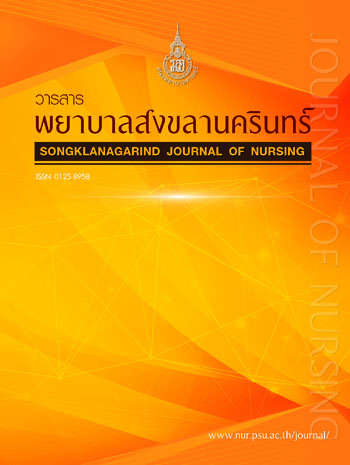Effect of Al-Quran Recitation Listening and Quiet Hour Preparation on Sleep Duration of Premature Infants
Main Article Content
Abstract
Promoting longer deep sleep in preterm infants in the Neonatal Intensive Care Unit (NICU) is
a challenging role of nurses. This quasi-experimental research and cross-over design aimed to compare the sleep duration of premature infants during 4 environmental designs; Al-Quran recitation listening and quiet hour preparation, Al-Quran recitation listening, quiet hour preparation, and in normal environment of the neonatal intensive care unit. Twenty-eight premature infants with gestational age 32-35 weeks who admitted to the NICU, Yala Hospital were purposely selected. Data were collected using the sleep duration of premature infants record form and sleep-wake behavior evaluation guideline for premature infants. Data were analyzed using descriptive statistic and one-way analysis of variance. The Kruskal-Wallis H Test was used to compare the differences between the median of active sleep duration.The results of this study revealed that the mean of total sleep and deep sleep duration of premature infants during Al-Quran recitation listening and quiet hour were statistically significant more than Al-Quran recitation listening, quiet hour, and in normal environment of the neonatal intensive care unit (p < 0.01). There was no a significant difference of the median of active sleep duration of premature infants during 4 environmental designs.
Al-Quran recitation listening and quiet hour preparation can be used to promote sleep among premature infants.


